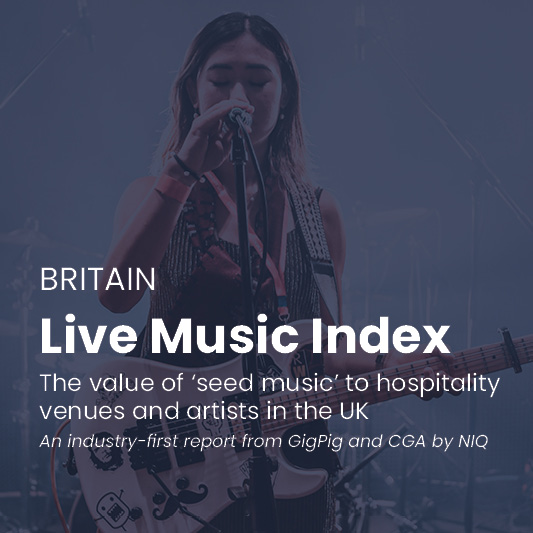
Based on a nationwide survey of more than 1,000 artists and over 500 venues, the UK’s first Live Music Index found that if all venues with the potential to show live music did so, it could be worth up to £2.4bn in revenue in the hospitality sector. By creating a stage for musicians to perform, an individual managed pub or bar could see their sales soar by an average of £107k a year.
The Live Music Index conducted by CGA by NIQ and commissioned by live music marketplace GigPig, in conjunction with the Night Time Industries Association (NTIA), Live music Industry Venues & Entertainment (LIVE), Pirate.com and Play Music Today (PMT), has been published to reveal the size and impact of this previously-unreported section of the UK’s music industry.
According to the industry-consortium led by GigPig, it’s time to wake up and smell the flourishing benefits of the UK’s ‘seed’ music scene. Report findings include:
Live music a lifeline for UK pubs, bars and restaurants
While live music has long been a staple of Britain’s pubs and bars, it is now becoming a lifeline for venues struggling to stay afloat. Nearly three quarters (73%) of the venues surveyed host live music at least once a week, helping boost sales by 33%, footfall by 36% and average spend per visit by 64%. The report outlines how bars would likely benefit from the biggest revenue uplift, with an annual expected rise of £240k.
Gigs in pubs and bars set for dramatic growth
According to the report, the ‘seed’ music scene is braced for dramatic growth, with nearly nine out of ten venues (87%) planning to increase their live music offering over the next 12 months. This is primarily to improve the atmosphere and customer satisfaction (87%), increase revenue and footfall (79%) and support local artists (48%).
Gigging in the hospitality sector pays off for artists
Of the 43,000 plus musicians in the UK, more than half (56%) regularly gig at pubs, bars, restaurants and clubs. On average those gigging in the ‘seed’ music sector earn £25,000 per year, rising to over £30,000 for artists using the GigPig platform. Surprisingly, the highest 9% of artists using GigPig earn as much as £60,000 annually.
The ‘Seed’ music scene is helping artists top up their income
The ‘seed’ music scene is also playing an important role in helping UK musicians access supplementary work, with nearly two thirds (59%) gigging to top up their income. In fact, only 6% of artists surveyed gigged full time, 20% part time and the vast majority (75%) on a casual basis. More than two thirds (65%) of artists said they want to gig full-time.
Co-founder of Manchester venue One Eight Six, Dean Cammack, is also a gigging artist and purposefully put live music at the centre of his venue. He said: ”Live music is a massive driver for the success of hospitality venues. It is core to delivering an atmospheric moment and we know it makes us stand out in an increasingly competitive market.”
Cammack added: “We have invested heavily in the sound system, staging, lighting and equipment to offer a high quality product for our customers; and then our weekly artist bill is around £15k because without live music we wouldn’t be able to operate. Our product is based around live music and we will always look to offer more quality music experiences which will attract and entertain our customers.”
The ‘seed’ music scene is also helping over 20,000 artists who regularly gig in the nation’s pubs and bars earn up to 50%* more than the typical musician, with annual average earnings of £25,000. If all UK artists were to gig in the ‘seed’ music sector, the earning potential could be as much as £1.3bn – an estimated £400m in extra earnings for UK musicians.
Michael Forster, CEO at GigPig, said: “Gigging in the hospitality sector is the bedrock of the UK’s music industry. It’s what many of us who’ve dedicated our life to gigging have known, but it’s now clear that the hospitality sector is the cultural and economic lifeblood of the UK’s music scene. That’s why it’s our mission to help every venue become a stage, give every artist the opportunity to get paid to play and bring live music to every town and city in the UK. Music is the bedrock of our culture and identifying the ‘seed’ level is a huge step to understanding how we can nurture the next generation of global superstars.”
Nurturing the UK’s ‘seed’ music scene
Of course it’s not all rosy in the ‘seed’ music scene. More than half (56%) of venues said the profitability of hosting gigs is negatively impacted by the amount of time they have to spend sourcing and booking artists. Simplified booking process (48%), transparent pricing (47%) and access to a bigger artist talent pool (40%) would help ‘seed’ venues offer more live music and improve their bottom line, the survey found.
Michael Forster added: “While there is much to be celebrated from the Live Music Index, we also need to recognise that more still needs to be done to nurture and grow the UK’s ‘seed’ music scene. That’s why we’re leveraging technology to empower venues and artists to connect at scale, helping to create thousands of new gigging opportunities in towns and cities across the UK every month.”
The Live Music Index report makes five suggestions to help more venues and artists benefit from the UK’s ‘seed’ music scene. These are to capitalise on the demand for live music, support musicians, discover new talent, cut booking admin and invest in infrastructure. To download the full Live Music Index report, visit here.
* A recent study by the Musicians Union found the average musician earns £20,700 per annum.



